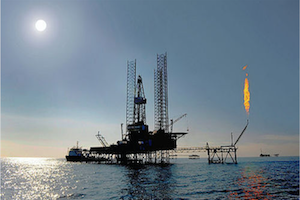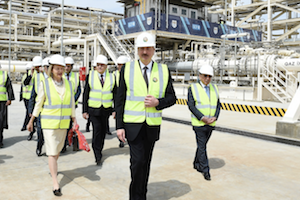The Perspective of Trans-Caspian Gas Flow to Europe
By Ilgar Gurbanov
October 25, 2018, the CACI Analyst
On August 12, Azerbaijan, Kazakhstan, Russia, Iran, and Turkmenistan signed the Convention on the Caspian Sea’s Legal Status in Astana. The Convention’s provision endorsing the construction of a subsea pipeline raised optimism regarding the Trans-Caspian Gas Pipeline (TCGP) project, which has been stalled due to the Caspian’s uncertain status. Discussions on the TCGP have been ongoing since the 1990s, envisaging the export of 30 billion cubic meters/year (bcm/y) of Turkmen gas to Europe across the Caspian by integrating with the Southern Gas Corridor (SGC).

New Southern Gas Corridor Project Will Intensify the Regional Pipeline Race
By Fuad Shahbazov
June 28, 2018, the CACI Analyst
On May 29, Azerbaijan’s President Ilham Aliyev officially inaugurated the first phase of the long-awaited flagship project Southern Gas Corridor (SGC), through which Caspian natural gas from the Shah-Deniz II field will be transported to Europe. The new project consists of several pipeline networks that pass through Georgia and Turkey (via the Trans-Anatolian Pipeline, TANAP) and further through Greece, Albania and Italy (via the Trans-Adriatic Pipeline, TAP). As Shah Deniz Stage 2 is implemented, gas production will increase from 9 to 25 billion cubic meters (bcm) per year.

Real friends? Georgia-Turkey relations in the wake of the July 15 coup attempt
By Boris Ajeganov
August 10th, 2016, The CACI Analyst
Georgian PM Giorgi Kvirikashvili became the first foreign head of state to visit Turkey after the failed coup attempt by parts of the Turkish military in the evening of Friday, July 15. Kvirikashvili met with his counterpart, PM Binali Yildirim, and President Erdoğan in Ankara on July 19 as part of an inaugural meeting of the High Level Georgia-Turkey Strategic Cooperation Council. The visit — the PM’s first official to Turkey — was planned long before the attempted coup. Although the event focused on bilateral trade and economic issues, both parties emphasized that the official visit demonstrated Georgia’s continued support for Turkey’s democratically elected authorities, despite concerns that Erdoğan used the coup attempt as pretext for a major purge of political opponents at all levels of government. In the end of the day, regardless of what direction Turkey’s politics take, Georgia does not have much of a choice but to toe its neighbor’s line, come rain or shine.
Russia and Turkey come back to the gas table
By Najia Badykova
July 20th, 2016, The CACI Analyst
On June 27, Moscow announced that Turkish President Recep Tayyip Erdogan sent a personal letter to Russian President Vladimir Putin expressing his “regret and sorrow” for the downing of a Russian plane last November and his wish to reestablish bilateral relations. This ended a seven-month standoff between Turkey and Russia that seriously threatened their political and economic relations. Moscow welcomed the apology. Both sides have strong reasons to resume and reinforce their relations. The rapprochement will allow a restoration of diplomatic relations, and remove trade sanctions and barriers to the development of a number of joint projects, including the planned Turkish Stream gas pipeline under the Black Sea. Yet while Ankara and Moscow may return to pipeline negotiations, the gas supply situation to Europe has changed since November. Moscow has made substantial progress pushing an alternative option – an expansion of the Nord Stream pipeline.
Despite Georgia-Azerbaijan gas deal, distrust is sown
By Boris Ajeganov
March 7th, 2016, The CACI Analyst
Uncertainty on the future of Georgia’s energy security has been growing since late 2015, when Georgia’s minister of energy and deputy PM Kakha Kaladze met with Alexey Miller, CEO of Russia’s Gazprom twice in the span of a month. Discussions on Gazprom’s potential return to the Georgian market quickly raised eyebrows in Baku and caused popular protests in Tbilisi. In a March 4 turnaround, Kaladze announced a deal to receive additional gas from Azerbaijan, thus removing the need to import Russian gas. Party politics aside, Tbilisi appears to have skillfully used its strategic position in the South Caucasus to secure a favorable energy deal without sacrificing its sovereignty.





